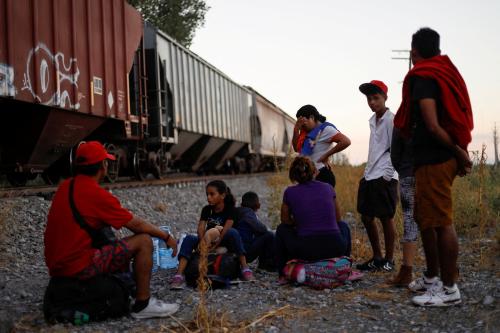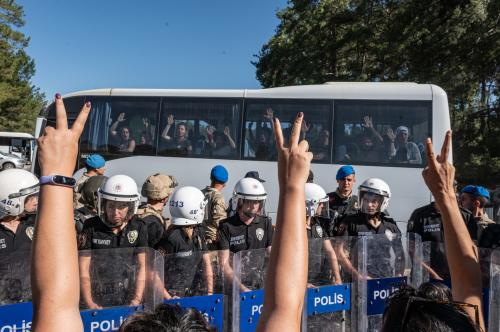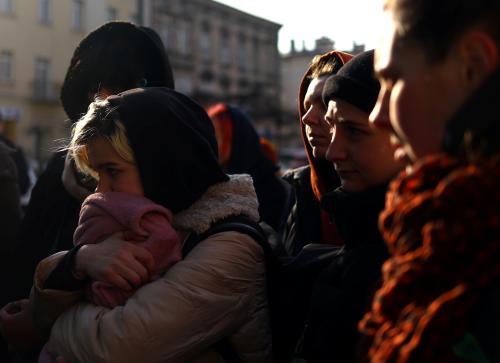Provincial elections are an important step toward national reconciliation in Iraq, but steps must be taken to ensure that the displaced – both refugees and internally displaced persons (IDPs) – are able to participate. A significant milestone was reached on 24 September when Iraq’s Parliament adopted a provincial elections law. The agreement provides for elections before 31 January 2009 in 14 of the country’s 18 governorates while elections in Kirkuk, the key sticking point in previous negotiations, along with the three Kurdish-controlled provinces, will be postponed.
But it’s not enough for the law to be in place and for elections to be scheduled. All Iraqi citizens must be able to vote and the turnout must be sufficiently high to assure that the elections are seen as legitimate. One of the major threats to this legitimacy is the way in which Iraq’s 2 million or so refugees and its 2.8 million internally displaced persons (IDPs) are included in the electoral process. So far, there are no provisions for Iraqis living outside the country to vote. This means that close to 10% of Iraq’s population will be disenfranchised. This once again calls into question the legitimacy of the elections– a prospect to be avoided after the experience in the last elections.
Despite the plethora of media covering triumphant Iraqi voters raising ink-stained fingers in the 2005 elections, not all Iraqis bought into the process. Key political groups boycotted the vote and IDPs were not able to make their voices heard. Interestingly though, arrangements were made so that Iraqis living outside the country could register and vote – and apparently they did so in large numbers. This year the situation has been reversed: those living outside the country are not allowed to vote while provisions have been made for internally displaced Iraqis (those displaced by the violence after April 2003) to participate. Iraqis overseas – particularly those displaced since the start of the war – should be able to vote in the upcoming elections. And IDPs should be encouraged to register and to turn out to vote. While mechanisms are in place this time around to ensure IDP voting rights, the Wall Street Journal reports that only 100,000 IDPs have registered to vote in the provincial elections while other sources put the figure even lower.
Participation of Iraq’s refugees and IDPs in the provincial elections is critical to a legitimate electoral process, national reconciliation, and regional stability. Many of the Iraqi refugees currently living in harsh conditions in Jordan, Syria, Lebanon, Egypt, Turkey, and the Gulf were displaced because of their religious or political beliefs or because they favored a secular Iraq. To exclude these Iraqis from the process is to let the militias’ efforts to rid the country of secularists, intellectuals, Catholics, Yezidis, and many other minority groups win.
How IDPs’ votes are counted – or actually where they are counted – is another key issue in the upcoming elections. The problem with requiring IDPs to vote for provincial leaders who will govern in their place of origin is the fact that many IDPs will likely never return to their home communities. Some may have found jobs and established new lives in their host communities, some may be too frightened to think about returning; others may be planning to move elsewhere or even to seek refuge abroad. There are other problems with requiring displaced Iraqis to vote for officials to govern their current location as well; if they do plan to return home, should they have a say in electing officials in their temporary settlement? Given the ethno-sectarian cleansing that has gripped many of Iraq’s multi-ethnic and multi-religious cities, IDP voters could strongly influence the election outcomes. For example, allowing Sunni IDPs to vote in their former place of residence – perhaps now dominated by Shi’a communities – defies the efforts of militias to segregate Iraqi civilians along sectarian lines. However, it also might be too optimistic to assume that the majority of IDPs will ever benefit from provincial policies adopted in their home governorates.
Research has shown that those displaced by violence usually vote at lower rates than those who have not been uprooted. Sometimes there are bureaucratic obstacles to voting. Sometimes the displaced see the political process as irrelevant to their pressing day-to-day needs. But in democracies, when IDPs don’t vote, politicians don’t feel the pressure to respond to their concerns. And when politicians are seen as unresponsive to their needs, IDPs have little incentive to participate in the political process. In order to break this vicious cycle, every step should be taken to encourage and support those displaced by the violence – whether at home or abroad – to vote in the upcoming elections. Earlier this year, after all, the Iraqi government allocated just $200 million – out of a $70 billion budget — for Iraqi refugees and internally displaced persons who together represent around 20% of the country’s population It is not only important that IDPs vote and are able to hold their leaders accountable. This is also a test of Iraq’s democracy. It is vital that those most marginalized, and most affected by violence, are included in this process. It’s important for the legitimacy of the elections and is a crucial step in moving toward national reconciliation.



Commentary
Op-edIraqi Elections and Displacement
October 2, 2008